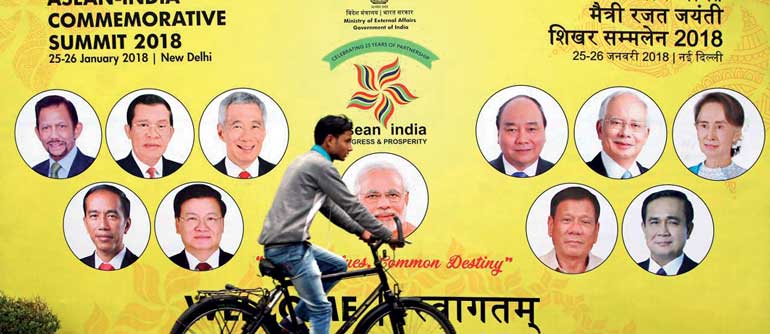Saturday Feb 21, 2026
Saturday Feb 21, 2026
Thursday, 25 January 2018 00:00 - - {{hitsCtrl.values.hits}}

New Delhi (Reuters): India is gathering the leaders of the Association of Southeast Asian Regional Cooperation (ASEAN) for a summit on Thursday to promote maritime security in a region dominated by China, officials and diplomats said.
India has been pursuing an “Act East” policy of developing political and economic ties with Southeast Asia, but its efforts have been tentative and far trail China, whose trade with ASEAN was more than six times India’s in 2016-17 at $ 470 million. China has also expanded its presence in South Asia, building ports and power plants in countries around India’s periphery, such as Pakistan and Sri Lanka, and spurring New Delhi to seek new allies.
Indian Prime Minister Narendra Modi has invited the leaders of all ten ASEAN nations to join him in the Republic Day celebrations on Friday in the biggest ever gathering of foreign leaders at the parade that showcases military might and cultural diversity.
The leaders, who include Myanmar’s Aung San Suu Kyi, Indonesian President Joko Widodo and Philippine President Rodrigo Duterte, will hold talks on maritime cooperation and security, the Indian foreign ministry said in a statement.
Both India and the Southeast Asia nations have stressed the need for freedom of navigation and open seas and India already has strong naval ties with countries such as Singapore, Vietnam, Indonesia, Thailand and Malaysia, Indian Ministry of External Affairs Secretary (East) Preeti Saran said.
“The ongoing activities of ship visits, of coordinated patrols, of exercises that take place bilaterally, are taking place very well,” Saran said. “And every time we have defence to defence talks or navy to navy talks, there is a great deal of satisfaction that has been expressed by the ASEAN member countries.”
But several Southeast Asian countries locked in territorial disputes with China have sought even greater Indian engagement in the region, experts say.